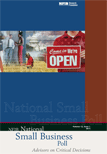Advisors on Critical Decisions
• Business confidantes are the most common and influential small-business advisors. Two of three (67%) owners have such a person, that is, a single person who they consult prior to addressing a serious business problem or making a critical business decision. Business confidantes have typically served in that capacity since the business was founded.
• Twenty-three (23) percent of the small-business owners do not engage any person or persons in their deliberations when confronting a difficult business problem or critical business decision. They rely on themselves.
• Engaging different people for different situations appears to be the most productive consulting style in terms of profitability and employment increase/loss of the three styles examined. Relying on confidantes appears less productive and not engaging anyone appears even less so.
• The firms/occupations that small-business owners most frequently solicit for advice and/or counsel are accountants, insurance agents/brokers, other business owners, suppliers, bankers, IT consultants, including Web designers, and lawyers in that order. Thirty-five (35) percent consulted an accountant more intensively in the last 12 months than any other outside advisor.
• The median amount of time that a small employer or his/her designee spent with the firm/individual that he/she worked with most intensively the last year was 16 hours. The median amount of money spent on it was about $2,000. The average was significantly higher.
• Small employers who solicit advice tend to implement that received. However, most carefully filter it, picking and choosing what they find useful and discarding the rest. About two of three who solicited advice in the last 12 months were able to implement a majority of what they received.
• The subject matter of the year’s most critical decision varied widely – sales or marketing, 22 percent; operations or purchases, 21 percent; finance, 17 percent; and disposition or changing size of the firm, 13 percent. Fifteen (15) percent claim the year’s most significant decision involved the very existence of the business.
• Discovering critical problems that need to be addressed is often more challenging than resolving them. In one of three cases, owners were surprised to find the matter that created the year’s most critical business decision.
• Within a week of discovering the matter that required the year’s most critical decision, half of small-business owners began to pursue a corrective course of action. Those waiting longer solicited counsel from more people about the matter. But the speed of instituting corrective action was not related to the seriousness of the matter.
• Small-business owners are substantially more likely to solicit information than they are to solicit direction. They also typically consult more people when the business decision is more serious.
• The most helpful advice paid consultants and vendors and suppliers typically provide is adding detail and depth to the owner’s basic ideas.
• Forty-seven (47) percent of small employers did not seek out anyone to discuss the year’s most significant business decision. The most frequent reason (56%) offered for pursuing this closely held course of action is that they knew what they needed to do as soon as they recognized the matter. The second most frequently cited reason was privacy (22%).


